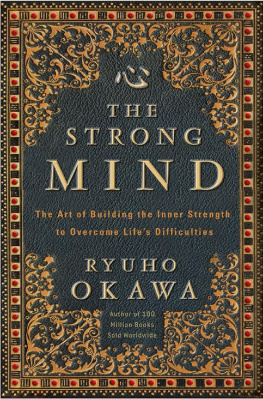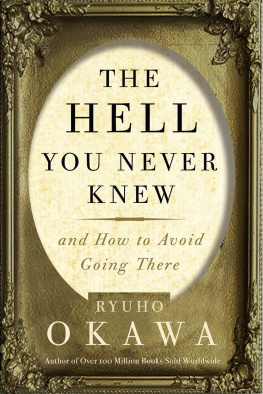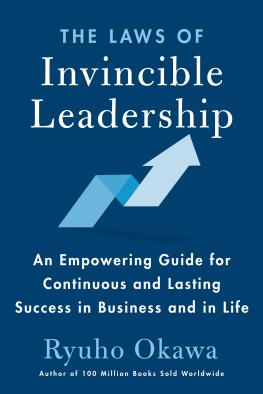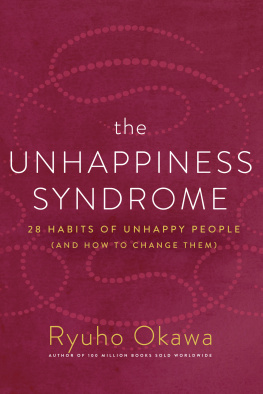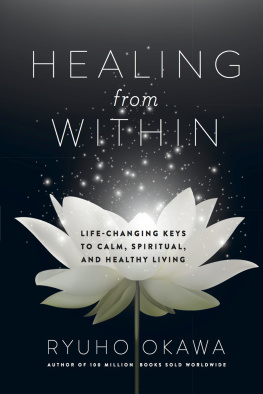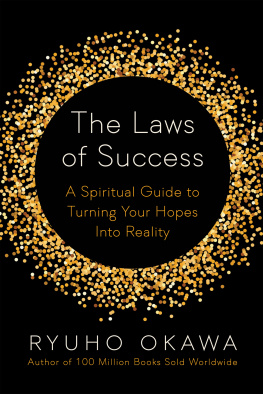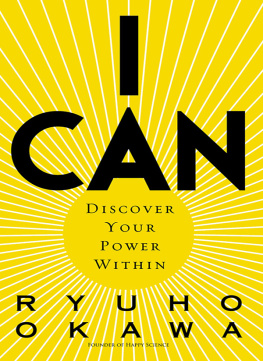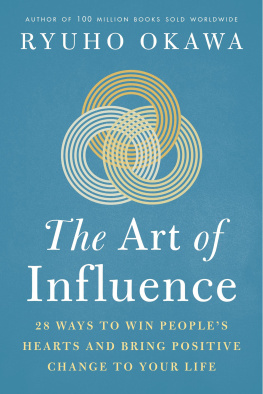THE STRONG MIND
The Art of Building the Inner Strength to Overcome Lifes Difficulties
Ryuho Okawa
Founder of Happy Science
IRH Press
THE STRONG MIND
The Art of Building the Inner Strength to Overcome Lifes Difficulties
Copyright 2018 by Ryuho Okawa
English translation copyright Happy Science 2018
Originally published in Japan as Strong Mind by IRH Press Co., Ltd., in September 2010.
ISBN: 978-1-942125-39-6 / 1-942125-39-9
PUBLISHED BY:
IRH PRESS
Cover Design: Whitney Cookman
Interior Design: Juicebox Designs
All rights reserved. Without limiting the rights under copyright reserved above, no part of this publication may be reproduced, stored in or introduced into a retrieval system, or transmitted, in any form, or by any means (electronic, mechanical, photocopying, recording, or otherwise) without the prior written permission of both the copyright owners and the above publisher of this book.
eab:20180409
CONTENTS
PREFACE
In this book, The Strong Mind, I present essential ideas that epitomize my thinking on the mental attitudes we should cultivate and my philosophy on life during the period when I was maturing as a religious leader. These pages show the ways to overcome lifes obstacles and barriers, the human qualities that will enable you to achieve great success, and vital secrets to triumphing in your life.
What I went through during the last several decades after my spiritual awakening strengthened my heart and mind and helped me develop my capacity and depth as a person. In this period, I tasted suffering and sadness to a degree never experienced by an average person.
Over the years, I have produced a vast body of published works and lectures that include a diverse array of perspectives, and all of them represent the days I spent cultivating a strong mind through hardship.
Each day, whether it brought raging wind, rain, or swelter, I sought to transform the weak mind into a strong mind. And as I have walked the path to self-improvement, my other self has always been there, watching over my every step on this journey.
Ryuho Okawa
Founder and CEO
Happy Science Group
CHAPTER 1
BUILDING RESILIENCE AGAINST LIFE CRISES
LIFE CRISES ARRIVE ONCE EVERY DECADE
The Underlying Message of the Proverb Fall Seven Times but Rise Eight Times
I would like to begin this chapter with a discussion of a common Japanese proverb, Fall seven times but rise eight times which describes a mind that never gives up. Actually, Ive always thought that this count was a bit odd. If you fall seven times, you can only get up seven times. So Ive been wondering for some time how it would be possible to fall seven times but rise eight times. But I figured that the key here is probably that we need to be determined to rise one extra time every time we fall. Put another way, if bad things happen to us seven times, we should do eight good things so that we can bring about a positive outcome in the end. I believe that this is the point of this saying. Although the numbers dont technically add up, the saying conveys the importance of adopting a spirit of resilience; we must be ready to rise to our feet one extra time as we face lifes trials and tribulations.
I find it quite interesting that the numbers used in this proverb, seven and eight, seem to match the average number of major crises that we encounter during our several decades of living in this world. This may be a nugget of wisdom that has survived in the form of a proverb to help us weather the vicissitudes of a lifetime. Through the course of our lives, we face an average of about seven critical situations that can become stumbling blocks, so we should be prepared to rise up eight times to end our lives on the positive side. This means that we encounter a major life crossroad about every ten years.
CHILDHOOD:
A Period of Crisis within the Family
The first period in which we encounter a crisis is usually around age ten, or in fifth or sixth grade. This often involves family trouble: a quarrel, divorce, or layoff. It could also be a school-related problem such as a conflict with a friend, bullying, or truancy. These are the issues we most often encounter in our childhood.
TWENTIES:
A Period When We Suffer Our First Major Setbacks of Adulthood
The second major crisis usually arrives at around age twenty, give or take a few years. Everyone gets tested before reaching adulthood. This test may involve choosing an academic or career path. It is also during this period that we struggle to begin serious relationships or find life partners. And this often triggers our first disappointments as adults that have a life-changing impact on us. This is a common experience that we go through in our late teens or early twenties.
THIRTIES:
A Period When Our Ability to Provide for Ourselves and Our Families Is Tested
We usually become fully financially independent around age thirty. This is a period when our ability to be truly self-reliant is tested. We may face the financial challenge of becoming self-sustaining without relying on others support. If we are married, we may face concerns about our ability to provide for a family. In any case, something will happen to measure our competence as full-fledged, independent adults in our late twenties or early thirties.
FORTIES:
A Period When We Face Difficult Work Issues or Health Problems
There are two basic kinds of challenges we are likely to face as we approach forty. By this time, many of us have achieved mid-level managerial positions. We face issues related to job promotion, which is often a benchmark for our further career advancement to top executive positions. But statistically speaking, more than half of employees unfortunately never make it past mid-level managerial positions during their lifetimes. This percentage may vary depending on the occupation or industry, but it is more or less the same in each field. In trading firms and other commercial enterprises that have a large number of managers, about half of the employees can reach middle-management positions. But in manufacturing companies with large workforces, only about 10 to 15 percent of employees can achieve managerial positions. This is an example of a possible barrier to success that we may face in our work lives.
We may also face crises relating to health or family. If you are raising a family while working full-time, you may find it increasingly difficult to recover from fatigue as you approach forty. The busyness of everyday life may start taking a toll on your body and cause health problems. Your condition may often be exacerbated by family troubles that involve your children, since childrens troubles tend to become more serious and frequent as they age.
Age forty often marks a turning point for our bodies; we begin experiencing many symptoms and health problems that we didnt experience in our younger days. Hormone changes occur during this period, and many women start going through menopause between their late forties and early fifties. At first, many of them do not realize that they are experiencing menopause symptoms, so they are confused about why they are feeling unwell or experiencing emotional ups and downs. And because they do not understand the causes themselves, they dont reach out for help or support and end up suffering more than they have to. For example, you may suddenly find yourself unable to control your emotions, getting irritated for no apparent reason, and taking it out on a family member, even though you know very well that this isnt the kind of person you really are. This type of trial often awaits us in our forties.
FIFTIES:
A Period When We Are Met with the Reality of Aging
Age fifty is said to be the threshold of old age. Personally, I prefer not to use this expression, because it brings to mind an image of our bodies quickly weakening. But in reality, it is true that during this period of life, our hair increasingly goes gray, and some of us may start losing our hair. If you run into an old friend that you havent seen in ages, you may not even recognize him because his thinning hair makes him look so differentyou may even wonder what happened to him to change so much.
Next page
